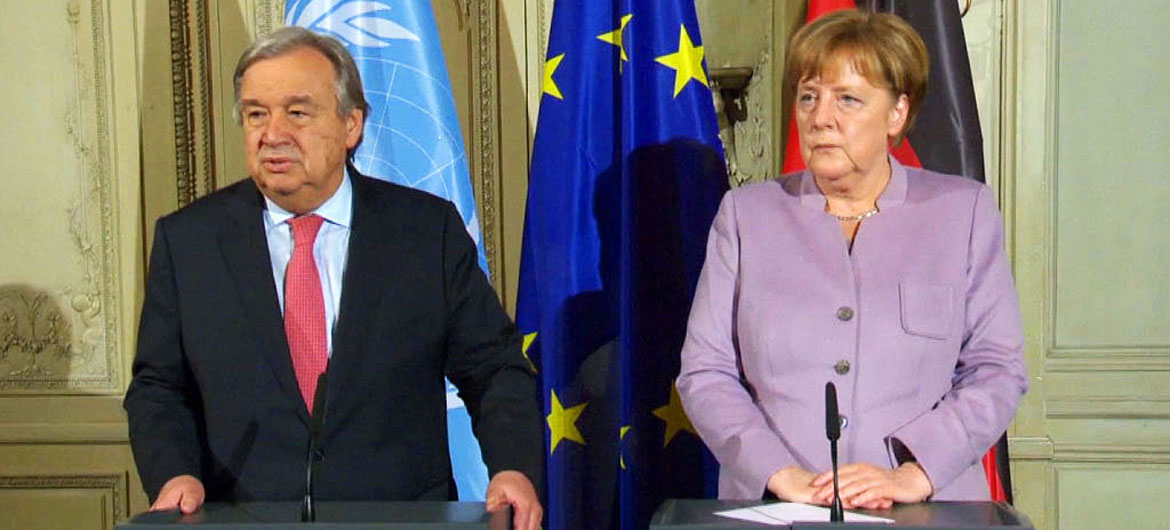By George Gilson
The government hopes its sweeping stimulus measures can keep an economy still reeling from a ten-year economic depression on a respirator as Greek business and labour face the spectre of total disaster and Berlin to date is steadfastly rejecting the calls of Prime Minister Kyriakos Mitsotakis, the leaders of France, Italy, Spain, and six other countries who in a letter to European Council President Charles Michel issued a plea for the issuance of an emergency coronabond.
Germany and the Netherlands have taken the hardest line as they stubbornly refuse the mutualisation of debt despite or perhaps because of the fact that the German economy is also being hit hard with even industrial giants like Daimler Benz already confronting a major crisis that some analysts believe in a worst case scenario could lead to the once inconceivable prospect of nationalisation.
Critics suggest that the EU is descending into a Hobbesian state of nature, a war of all against all against all in which the staunchest fiscal hardliners – mainly The Netherlands and Germany – are adopting a stance that suggests that each country is essentially on its own and out for itself and have at times shocked other member-states with their rhetoric.
Berlin proposes that those hardest hit repair to the ESM for loans that would break the back of the highly indebted countries.
Even as the coronavirus pandemic is bringing other EU countries to their knees, Dutch Finance Minister Wopke Hoekstra is criticising the economic sins of wayward countries which in the past had strayed away from fiscal discipline.
They have insisted so far that the mutualisation of debt (which means the German and Dutch taxpayer will foot a large part of the bill) even in an existential crisis that strongly threatens the eurozone and the European project itself is forbidden.
Some analysts believe that Chancellor Angela Merkel will step in only when the eurozone faces an immediate threat of collapse.
For the time being calls for an unprecedented global coordination and cooperation is falling on deaf ears in Washington and Berlin.
OECD Secretary-General Angel Guria has called for a global Marshall Plan obviously in order to avert the implosion of the global economy.
Ahead of the most recent G20 meeting Gurria tabled a series of emergency measures to help the international economy weather the current tempest and future shocks:
- Recapitalise health and epidemiological systems
- Mobilise all macroeconomic levers: monetary, fiscal, and structural policies
- Lift existing trade restrictions especially on much needed medical supplies;
- Provide support to vulnerable developing and low income countries;
- Share and implement best practices to support workers and all individuals, employed and unemployed – particularly the most vulnerable;
- Keep businesses afloat, particularly small and medium-sized firms, with special support packages in hardest hit sectors such as tourism.
UN: Multi-partner Covid-19 trust fund, global change of course needed
UN Secretary-General Antonio Guterres has said that debt alleviation and a focus on social welfare must be a priority and underlined that the UN is“fully mobilised”
It is establishing a new Multi-PartnerTrust Fund for Covid-19 Response and Recovery to tackle the emergency and recover from the socio-economic shock.
“When we get past this crisis, which we will, we will face a choice. We can go back to the world as it was before or deal decisively with those issues that make us all unnecessarily vulnerable to crises,” he said.
FT : EU countries battered by crisis could issue their own bond
An analysis by FT associate editor and columnist Walter Munchau in view of German resistance to an EU-wide mutualisation of debt proposes that the nine countries demanding a coronabond form a coalition of the willing, issue their own bonds which they would back by sharing the debt collectively, and persuade the ECB to buy them as part of a pandemic purchasing programme.
“Legally, a mutualised debt instrument between a group of sovereign states would still count as national debt. The repayment obligation would be shared. This would not reduce the debt load of vulnerable member states in a way a properly designed EU-wide instrument could. But, at the very least, it would set a precedent, and raise some money,” he says.
Greece: 6.8bn euro package to boost health system, business
Finance Minister Christos Staikouras, Labour Minister Yannis Vroutsis, and Development Minister Adonis Georgiadis this week announced an inter-ministerial package that expands the number of categories of beneficiaries of previous measures.
These include paying for the month of March 800 euros to employees of businesses that have been shut down by epidemic containment measures and support for owners that is linked to a commitment not to lay off employees for at least six months following their re-opening.
Those working in a number of professions and trades that were not initially included lobbied hard to enter the programme and many were.
Staikouras said that 1.7mn salaried employees, 800,000 businesses, and 700,000 self-employed and freelance professional will benefit from the stimulus package.
He said the spending for March and April on bolstering the health system and businesses amounts to 6.8bn euros (3.5 percent of GDP), and that in addition Greece will receive aid from the EU National Strategic Reference Framework (ESPA) and other EU programmes.





